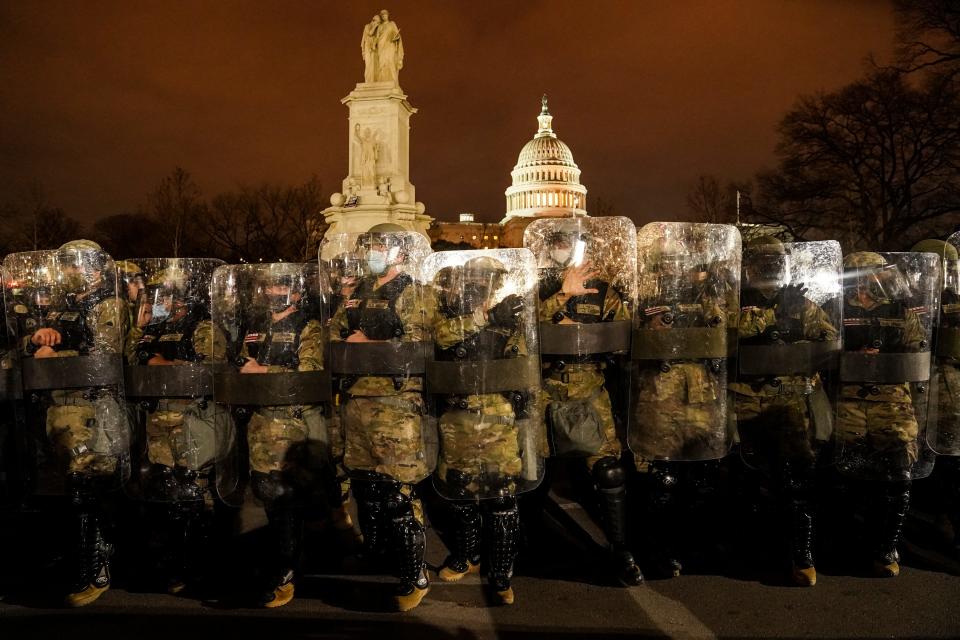Rep. Maddock's comments about a civil war aren't just irresponsible – they're dangerous | Opinion
- Oops!Something went wrong.Please try again later.
- Oops!Something went wrong.Please try again later.
Oh, state Rep. Matt Maddock, you rakish scamp you, trying to be kinda Lincoln-esque with your warnings about civil war. Not quite on the level of a "house divided cannot stand," but there you were, saying that if law enforcement keeps going after conservatives, there will be civil war, then warning your guys will be mushed. Lordy, lad, breathe oxygen, please.
Saying there will be violence — in fact, a civil war or revolution — predicting it, saying it should be expected, was, however, not the most disturbing thing the Milford Republican has said recently.
Most disturbing was what Maddock did not say. For not once did he oppose violence, say it was wrong, or that no one should encourage violence.

Nope, Maddock said "someone" will get super mad, shoot someone else, there will be civil war, and "we" — meaning, one presumes, today’s conservatives — will suffer more violence.
Which makes what he said irresponsible and dangerous.
The threat of mass political violence in America is nearly as high as just before the real Civil War, 160 years ago. Maybe not quite to that level — though some suggest that’s the road we’re on — but tragedy is possible.
Therefore, we all have a responsibility — and political leaders like Maddock have an especially acute responsibility — to discourage political violence. Yes, be outspoken about your views, try to convince people that you're right, or to vote for your candidates. Be snide, if you must, but it’s best to be polite when doing so.
But always remember: Your enemy ain't the guy who voted a different way.

The American Anocracy?
Violence is so close. Just this past weekend, a California woman was murdered for displaying the pride flag outside her shop. Similar flags she had flown before had been vandalized or stolen. In metro Detroit, people have reported pride flags and Black Lives Matter signs stolen or damaged (this reporter has personal knowledge of a suburban church that has been so victimized).
Of course, we have seen mass political violence in America. And recently. Nine people died because of that violence. Most of us were horrified by it and what it meant. Hundreds of people have been charged, and convicted, for that violence. One particular individual has recently been indicted for his alleged role in fomenting that violence.
But now millions of people equate the Jan. 6, 2021 violence with a Sunday walk in the park. They call for pardons for those convicted. That individual, former President Donald Trump, leading — and indicted — Republican presidential candidate, former President Donald Trump, said he would pardon the convicted Jan. 6 criminals.
More from Lindstrom: Opinion: Thank Trump for swell of third-party interest in Michigan
This is who Michigan's next senator should be
That horror helped lead the Center for Systemic Peace, which studies political violence, to declare the U.S. is losing its democracy. Is the U.S. now an “anocracy” — half-democracy/half-dictatorship?
Depressingly, backing violence isn’t isolated to some Trump supporters. A survey by the Chicago Project on Security and Threats at the University of Chicago projects that startling numbers of American adults believe radical or even violent means may be required to achieve their political goals, whether it's restoring Trump to the presidency, or reinstating national abortion rights.
I recently wrote that the 2024 election will be decided by the angriest voters, and that we must restore the idea of deciding elections on policy, not personality. I recognize that anger, if managed, can be a positive motivating force (most societal improvements in civil rights, health care, education, pick an issue, resulted because people were angry at current conditions.)
I also know uncontrolled anger leads to violence. And I know we all must take every opportunity to denounce, discourage, derail all threats of violence in all forms.
Sadly, Matt Maddock — angry that his wife, former Michigan GOP Chair Meshawn Maddock, was indicted for her role in trying to overturn the lawful, certified 2020 election results — failed to take this moment to warn against violence. Protest her indictment? Sure. I understand wanting to protect someone you love, no matter the circumstances. But not by saying violence should be expected.

A question I didn't expect
Which brings me to a moment in 2008. A moment showing the sad state we now face, when too many people on all sides think political violence may be necessary.
In 2008, my publication (Gongwer News Service-Michigan Report) sponsored several journalists from Nigeria. They were here to study and report on the U.S. electoral process. The visiting reporters covered a rally with then-U. S. Sen. Barack Obama, soon to receive the Democratic presidential nomination. They attended other political events, and interviewed a number of top state and political officials, among them, Michigan Republican State Chair Saul Anuzis.
One journalist, Yemi Kolapo, asked Anuzis if he thought the presidential election between Obama and Republican Sen. John McCain would be particularly intense.
Yes, Anuzis said, things were likely to get pretty heated.
Kolapo nodded, then asked, “How many people do you think will be killed?”
Lindstrom on Trump: Can Trump win Michigan in 2024? These factors could affect his fate
This is America?
Anuzis was gobsmacked by the question. His eyes wide as dinner plates, practically leaping out of his chair, he shouted, “WHAT!?!”
It made sense to Kolapo. Hundreds of Nigerians had been killed in election violence the year before. It was the only electoral system she knew, and it was a natural question.
But to Anuzis and me, it was absurd. C’mon! This is America! We’d had more than 200 years of peaceful transfers of power. Sure, you might be angry your side lost, but you accept the people’s decision. We trusted our system, we trusted the people and processes. We understood you lost because your candidate ran a lousy campaign, or failed to connect on the issues, or wasn’t likable, or ... you don’t kill people over that, not here, anyway.
I won't soon forget that exchange I was present for in 2008, the way it sadly demonstrates how shockingly and wretchedly we have lost touch with each other, and with what the miracle of this nation has always been.
Can we hearken back to the civil disagreement and implicit trust we had in our own fellow Americans just 15 years ago?
Or — and let me put this to Rep. Maddock — in 2024, will I have to contact Yemi, and read to her the U.S. political death toll?
John Lindstrom has covered Michigan politics for 50 years. He retired as publisher of Gongwer, a Lansing news service, in 2019. Submit a letter to the editor at freep.com/letters.
This article originally appeared on Detroit Free Press: After Jan. 6, Maddock's comments about election violence are dangerous

